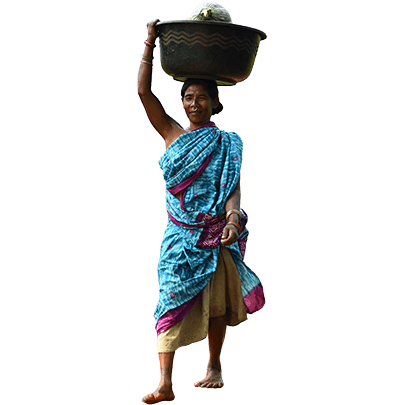Holistic Water and Food Security in Remote Rural and Tribal Odisha
The project 'Holistic Water and Food Security in Remote Rural and Tribal Odisha' sought to improve land productivity and livelihood potential of 1303 families in 27 villages and ensure access to safe water and sanitation for 525 families in Thuamul Rampur block of Kalahandi district in Odisha.
The project aimed to improve women and child health and food security of marginalised communities in Kalahandi district of Odisha.

REACH
1303 households, 27 villages
REGION
Kalahandi in Odisha
PROJECT STATUS
Completed
TIMELINE
September 2012 to June 2016
BUDGET
INR 2.78 crore
PARTNERS
Karl Kübel Stiftung
ACTIVITIES
- Watershed development activities such as land terracing, digging of contour trenches, construction of gully plugs; stone bunding, outlets, farm bunding and developing irrigation canals
- Construction of dug wells and promotion of social forestry and horticulture
- Promotion of sustainable agriculture practices and kitchen gardens
- Skill upgradation towards increasing local livelihood opportunities
- Building SHG capacities to undertake income generating activities
- Construction of toilets, bathing rooms and piped water supply systems
- Capacity enhancement of self-governing local institutions
RESULTS
- Different soil and moisture conservation measures including terracing, treatment of gullies, water retention measures, field bunding and plantation activities on community and private lands has led to promotion of second crop, especially vegetables and paddy in the rabi season.
- Youth received skill development training in masonry and plumbing because of which they are able to find employment in the area and their income enhanced by 48-50%. Eight SHGs have also been involved in enterprise such as nursery raising, puffed rice business and goat rearing.
- People’s institutions such as Bafla Gana Sangathan (BGS) and Karlapat Gana Sangathan meet regularly to discuss community issues. Members are informed about the various government policies and schemes. Gram Vikas’ staff have helped members of BGS access and leverage government agriculture and horticulture schemes.
- Among the families supported with different watershed and livelihood interventions, 59% of families have increased their family income during the project intervention; and 49% have increased their production.
- 48% families are food secure throughout the year as a result of the result of different project initiatives including watershed and agriculture development, livelihood enhancement etc
- 79% families with completed WASH infrastructure have reported significant reduction in water borne diseases like Diarrhoea and skin diseases. No diarrhoeal death reported in the village after completion of the WASH infrastructure.
- 67% of toilets and bathing rooms are regularly used and 45% cleaned regularly
- 46% of the households have backyard plantation and vegetable garden indicating increased availability of nutritious food
- 35% reduction in malnourishment through multiple activities including weaning food for the children above six months of age, regular use of toilet and bathing rooms, nutrition garden, increase in household income through different watershed activities and agriculture development initiatives etc.
- Strengthened self help groups with small capital and encouraged them to practice intra-lending of their own available resources